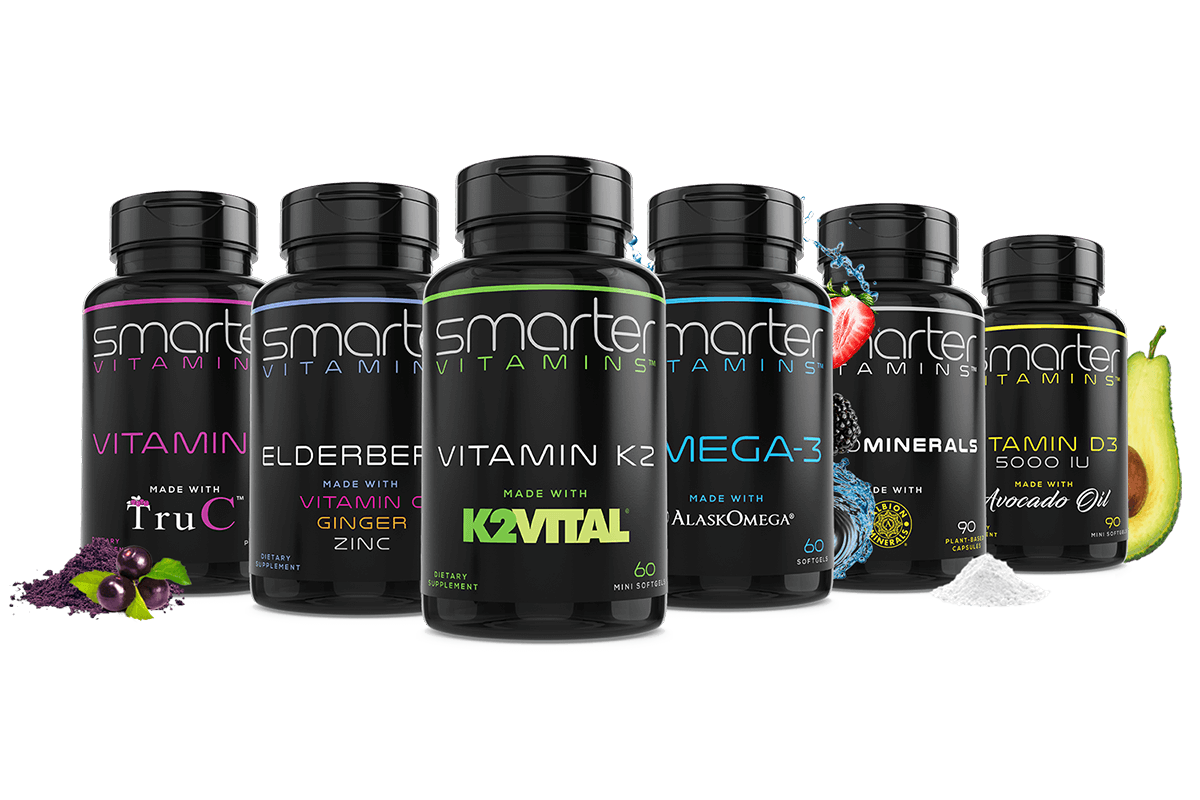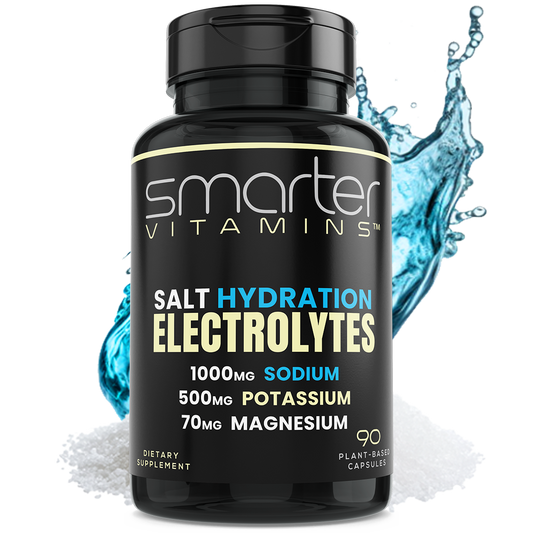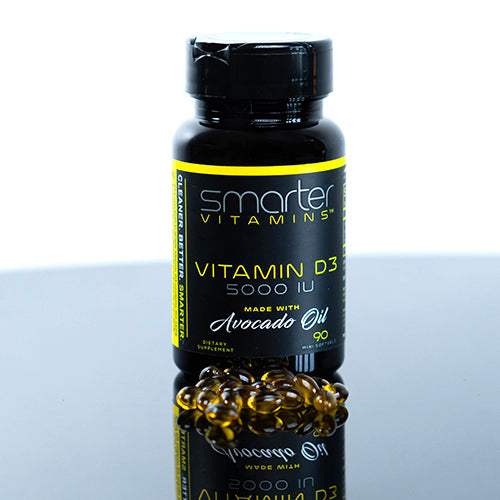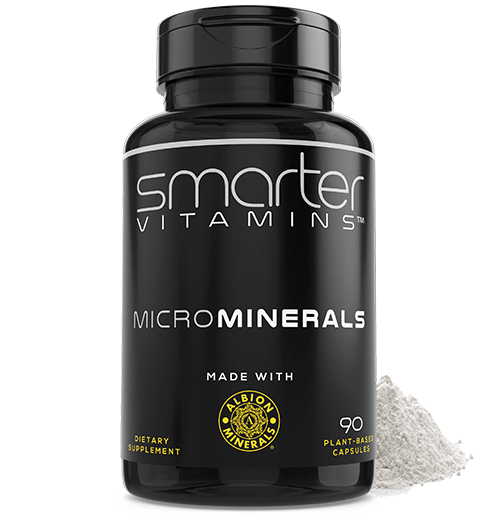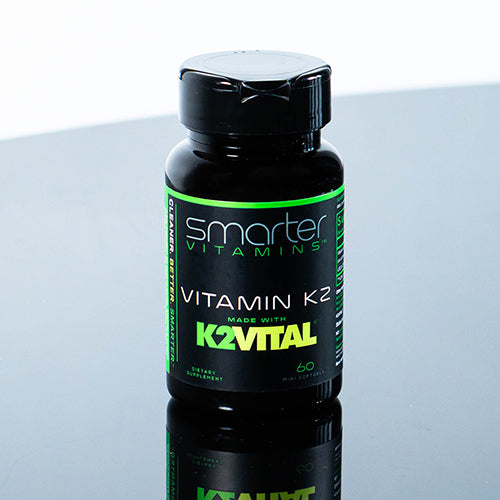Cleaner. Better. Smarter.
Made without the weird stuff.
magnesium stearate | dioxides | maltodextrin | carrageenan | soy milk | artificial colors | FD&C blue #1 #2 | FD&C green #3 | FD&C red #3 #40 | FD&C yellow #5 #6 | gluten | wheat | peanut | sugar | starch | lactose | soy bean oil | triacetin | corn oil | palm oil | talc | preservatives
Smarter 1000mg Omega-3 Fish Oil Supplement:
Best omega fatty acids
Frequentlyasked questions
What are Omega-3’s?
Omega-3 is an essential fatty acid (EFA), also known as a polyunsaturated fatty acid (PUFA). It’s derived from both animal and plant sources, although omega-3 from fish oil is the most common and popular supplemental form. Fatty acids form the main useful fraction of fats and oils and are necessary for overall health.* Because your body cannot manufacture essential fatty acids, you must get them from food or supplemental sources.*
Plant-source oils such as flax contain the parent omega-3 fatty acid called alpha-linolenic acid (ALA). The human body normally converts ALA to the longer-chain fatty acids eicosapentaenoic acid (EPA) and docosahexaenoic acid (DHA), which are used for prostaglandin formation and other cellular needs.* Fish oil contains the desired omega-3 fatty acids in their more useful EPA and DHA forms. ALA requires enzymatic conversion to generate EPA and DHA.*
Why do I need EPA and DHA?
You only need a quick web search for this one, because there is a wealth of information on this subject. Fish oil is not a magic bullet, but there are an infinite number of well-documented benefits for a whole host of lifestyle diseases and conditions. The short answer is that EPA and DHA are specific types of polyunsaturated omega-3 fatty acids. Your body cannot produce these fatty acids – you must get them from the food you eat, or via supplementation. EPA and DHA are natural anti-inflammatory agents, and as such, play a role in brain health, heart health, protection against cancer, Alzheimer’s and depression, improvement of skin conditions like psoriasis and acne, fetal brain development, inflammatory bowel disorders, and arthritis, to name a few.*
Our typical diets are rich in another type of pro-inflammatory polyunsaturated fatty acid called omega-6. When our dietary intake of omega-6’s far exceeds our intake of omega-3’s, our bodies experience a wide range of negative consequences, all with the underlying cause of increased systemic inflammation. Minimizing dietary intake of omega-6 fatty acids, and supplementing your intake of omega-3 fatty acids, helps to reduce inflammation, and the wide range of downstream effects.*
Why is our omega-3 fish oil molecularly distilled?
This processing technique guarantees the production of high purity EPA/DHA omega-3 fish oils and minimizes the presence of impurities.*
Can I take omega-3 fish oil on an empty stomach?
We recommend that adults take fish oil in the evening and that children take fish oil in the morning or afternoon. Whatever time you choose, don’t take fish oil on an empty stomach. Many people get queasy if they haven’t eaten.*
Will taking fish oil help me lose weight?
Probably not. But consuming healthy fats promotes the feelings of satiation, so it may indirectly curb your appetite and make it easier to eat less. Getting enough omega-3 can also rev up your metabolism, improve mood and reduce joint pain, making it easier to exercise. Some studies also suggest getting enough omega-3 can improve body fat deposition.*
Can fish oil help with joint pain?
Research shows that fish oil acts on the same biochemical pathways as non-steroidal anti-inflammatory drugs (like Ibuprofen and Aleve), but without the gastrointestinal side effects. However, the pain-relieving benefits of fish oil are dependent on the dose consumed.*
Does Smarter omega-3 fish oil have calories?
Yes. With any omega-3 fish oil supplement, you are consuming an oil that contains calories. Check the supplement facts to see the calorie count per serving.*
What should I look for when purchasing a fish oil supplement to ensure high quality?
► Third-party test results for purity and freshness. A third-party certificate of analysis indicates the levels of purity from environmental toxins, and the oxidation level (or freshness) of the oil.
► Manufacturing standards. Is the fish oil manufactured according to international quality standards
► Smell and taste. Does the fish oil smell or taste fishy? If so, the fish oil has most likely been exposed to oxygen and is becoming rancid. Rancid (oxidized) oils should be avoided, as they yield less-than-healthy effects. Avoid fish oils that have really strong flavorings added to them because they are most likely trying to hide the fishy flavor of rancid oil.
► Supportive scientific research to prove the efficacy of the fish oil brand.
► Sustainable fishing practices. Any environmentally responsible fish oil manufacturer should offer transparency into their fishing practices.
► Which bodies of waters do the fish come from? This is important as you want cold fresh ocean waters such as the bering sea where AlaskOmega® comes from.
NO BS. (Bad Stuff)
• fillers
• magnesium
• stearate
• dioxides
• silica
• maltodextrin
• carrageenan
• soy
milk
• artificial colors
• FD&C blue #1 #2
• FD&C green #3
• FD&C red #3 #40
• FD&C yellow #5 #6
• gluten
• wheat
• peanut
• sugar
• starch
• sodium
• lactose
• soy bean oil
• triacetin
• corn oil
• palm oil
• talc
• preservatives
800,000+ people
love our products
Experience the Power of Triple Strength Omega-3
Our fish oil is sourced from wild-caught, sustainable fish from the pristine waters of Alaska, and is then put through a rigorous filtering process to ensure its purity and freshness. Using only the best AlaskOmega® fish oil, we've created a powerful formula that's packed with essential Omega 3 fatty acids.
By taking our Triple Strength Omega 3 supplement, you'll experience a wide range of benefits that can help you feel and perform at your best. From improved cognitive function and mental clarity to better cardiovascular health and reduced inflammation, our Omega 3s can truly transform your overall well-being.
And the benefits don't stop there. Our fish oil is also great for promoting healthy skin, hair, and nails, as well as supporting joint health and reducing exercise-induced muscle soreness. Plus, our fish oil is sustainably sourced and traceable, so you can feel good about the impact you're making on the environment
CAUGHT IN ALASKA | MADE IN UTAH
We’ve searched the globe for the cleanest, most potent and freshest fish oil…
…and we came across AlaskOmega® and instantly knew this was the fish oil we were searching for.
Potent. Filtered. Cold Extraction. Triple Strength Omegas. Sustainable. Traceable. Alaskan.
Our Combos with Omega-3
Explore better health with our Omega-3 combo packs. Enhance heart health, cognitive function, and overall vitality with our curated bundles. Seamlessly integrate Omega-3 into your routine for transformative well-being. Don't miss out – prioritize your health with our thoughtfully selected packs today!
Click the links below to explore detailed information about our combos which include our Omega-3
NOTE: Links will direct you to the individual combo page in a new window, please close window if wanting to return to the smarter Omega-3 page
Fast Shipping
Risk Free
Made Here
Est 2016
Made with Non-GMO Ingredients
(cGMP) Good Manufacturing Practice
Made in a FDA
Registered Facility
Why you should choose SmarterVitamins 3x Strength Fish Oil
Smarter Omega-3 Fatty Acids
Improve your heart health with omega-3 fatty acids. These powerful nutrients lower triglyceride levels, reduce blood pressure, and provide protection against heart disease. Discover the natural way to a healthier heart today.
Enhance brain function with omega-3 fatty acids. Support cognitive health, boost memory, and reduce the risk of neurodegenerative diseases. Unlock the potential of your brain and experience improved mental clarity and focus.
Promote mood and mental well-being with omega-3 fatty acids. Say goodbye to depression, anxiety, and stress. These amazing nutrients have mood-enhancing properties that uplift your spirits and help you achieve a balanced state of mind.
Take care of your eyes, joints, skin, and respiratory health with omega-3 fatty acids. Don't miss out on the benefits of reduced inflammation, improved eye health, enhanced skin conditions, and relief from asthma and allergies. Make omega-3 fatty acids a part of your daily routine and experience a healthier, happier you.*
What sets us apart at SmarterVitamins is that we refuse to take shortcuts on our products. Our ingredients are best in class. Our formulas are unique and designed to improve human function. We hope to inspire next level performance through fitness, foods, and supplements.
| 乁(´•‿•`)ㄏ | OURS | THEM |
|---|---|---|
| Wild Ocean Caught | ✓ | X |
| Easy to swallow softgel form | ✓ | X |
| Over 5500+ Amazon 5 star Reviews | ✓ | X |
| From Pristine Alaskan Waters | ✓ | X |
| Triple Strength Omega-3s | ✓ | X |
| 2000mg per serving | ✓ | X |
| No Fishy Burps | ✓ | X |
| DHA & EPA | ✓ | X |
| Berry Flavored | ✓ | X |
| Made in the USA | ✓ | X |
| Third Party Tested | ✓ | X |
Other top rated supplements
Return Policy
Customer Satisfaction is our #1 Priority
If you are unhappy with a product,
simply return it within 60 days of recieving it
and we'll give you a full refund.
It's that simple.
It's that simple.
RESOURCES
Dietary omega-3 fatty acid and fish intake in the primary prevention of age-related macular degeneration: A systematic review and meta-analysis. Archives of ophthalmology (Chicago, Ill.: 1960). 2008;126(6):826.
Omega 3 fatty acids (fish oil) for maintenance of remission in crohn's disease. The Cochrane database of systematic reviews. 2014(2):CD006320.
Omega-3 polyunsaturated fatty acid (fish oil) supplementation and the prevention of clinical cardiovascular disease: A science advisory from the American heart association. Circulation. 2017;135(15):e884.
Eicosapentaenoic acid inhibits prostaglandin D2 generation by inhibiting cyclo-oxygenase-2 in cultured human mast cells. Clinical & Experimental Allergy. 1999;29(8):1129-1135.
Fish consumption and stroke risk in elderly individuals: The cardiovascular health study. Arch Intern Med. 2005;165(2):200-206.
A double-blind, placebo-controlled study of the omega-3 fatty acid docosahexaenoic acid in the treatment of major depression. Am J Psychiatry. 2003;160(5):996-998.
Long-term effect of omega-3 fatty acid supplementation in active rheumatoid arthritis. A 12-month, double-blind, controlled study. Arthritis Rheum. 1994;37(6):824.
Docosahexaenoic acid and adult memory: A systematic review and meta-analysis. PloS one. 2015;10(3):e0120391.










